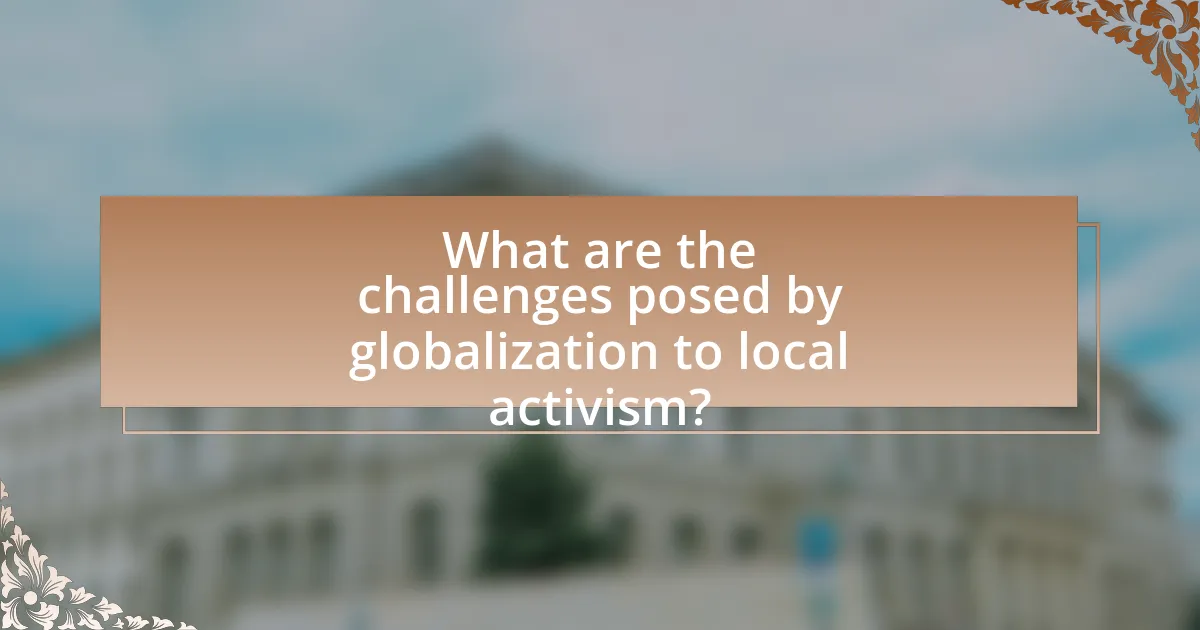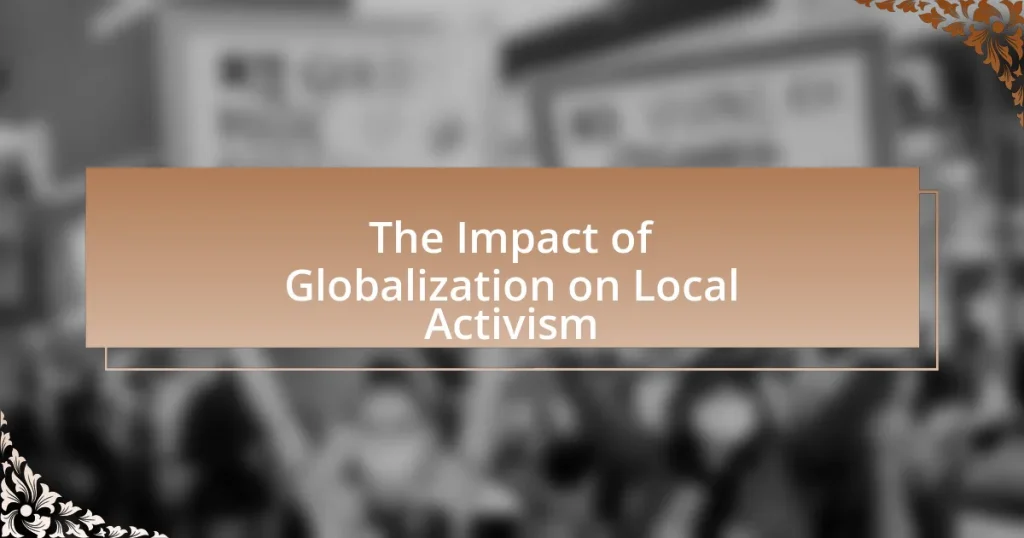The article examines the impact of globalization on local activism, highlighting how interconnectedness facilitates the exchange of ideas, resources, and strategies among activists worldwide. It discusses the positive effects of globalization, such as increased access to information and international support, as well as challenges like the dilution of local issues and economic pressures from multinational corporations. Key factors influencing local activism include social media’s role in mobilization and the necessity for local movements to adapt strategies that resonate with both local and global contexts. The article emphasizes the importance of understanding these dynamics for effective community engagement and policy-making.

What is the Impact of Globalization on Local Activism?
Globalization significantly influences local activism by facilitating the exchange of ideas, resources, and strategies across borders. This interconnectedness allows local activists to learn from global movements, adopt successful tactics, and gain access to international networks and funding. For instance, the rise of social media platforms has enabled local activists to amplify their messages and mobilize support on a global scale, as seen in movements like Black Lives Matter, which gained international solidarity. Furthermore, globalization can also pose challenges, such as the dilution of local issues in favor of global narratives, potentially undermining the specificity and urgency of local activism.
How does globalization influence local activism movements?
Globalization influences local activism movements by facilitating the exchange of ideas, resources, and strategies across borders. This interconnectedness allows local activists to learn from global movements, adopt successful tactics, and gain access to international networks and funding. For instance, the rise of social media platforms has enabled grassroots organizations to amplify their messages and mobilize support on a global scale, as seen in movements like Black Lives Matter, which gained international solidarity through online platforms. Additionally, globalization can lead to increased awareness of local issues on a global stage, prompting international advocacy and support, thereby enhancing the effectiveness of local activism.
What are the key factors of globalization affecting local activism?
The key factors of globalization affecting local activism include increased access to information, transnational networks, and economic interdependence. Increased access to information allows local activists to learn from global movements and strategies, enhancing their effectiveness. Transnational networks facilitate collaboration and solidarity among activists across borders, amplifying local issues on a global stage. Economic interdependence often leads to local communities facing challenges from multinational corporations, prompting activism aimed at addressing these impacts. For instance, the rise of social media has enabled local activists to mobilize support quickly and share their narratives widely, as seen in movements like the Arab Spring, where local actions gained international attention and support.
How do local activists respond to global trends?
Local activists respond to global trends by adapting their strategies to address local issues while drawing inspiration from global movements. For instance, the rise of climate change activism worldwide has led local groups to organize community-specific initiatives, such as local clean-up drives and educational campaigns, that align with global goals like the Paris Agreement. This localized approach allows activists to resonate with their communities while contributing to broader global objectives, demonstrating the interconnectedness of local actions and global movements.
Why is understanding this impact important?
Understanding the impact of globalization on local activism is important because it shapes how grassroots movements operate and influence change. Globalization can enhance local activism by providing access to international networks, resources, and information, which can amplify local voices and issues on a global stage. For instance, the rise of social media platforms has enabled local activists to connect with global audiences, as seen in movements like the Arab Spring, where local protests gained worldwide attention and support. This interconnectedness can lead to increased solidarity and collaboration across borders, ultimately strengthening local efforts for social justice and environmental sustainability.
What are the implications for community engagement?
The implications for community engagement in the context of globalization include increased connectivity and collaboration among diverse groups, which can enhance local activism. Globalization facilitates the sharing of resources, ideas, and strategies across borders, allowing local communities to leverage global movements for local causes. For instance, the rise of social media platforms has enabled grassroots organizations to mobilize support quickly and effectively, as seen in movements like the Arab Spring, where local activists gained international attention and support. This interconnectedness can lead to a more informed and active citizenry, but it may also result in challenges such as the dilution of local cultures and priorities in favor of global agendas.
How does this impact local policy-making?
Globalization impacts local policy-making by increasing the influence of global issues on local governance. Local policymakers must address transnational challenges such as climate change, economic inequality, and migration, which often require collaboration across borders. For instance, cities that engage in global networks, like the C40 Cities Climate Leadership Group, adopt policies that align with international sustainability goals, demonstrating how global frameworks shape local agendas. This interconnectedness necessitates that local policies reflect not only community needs but also global standards and practices, thereby transforming the policy landscape to be more responsive to international dynamics.

What are the positive effects of globalization on local activism?
Globalization positively affects local activism by enhancing access to information and resources, fostering collaboration across borders, and amplifying local voices on global platforms. Increased connectivity allows local activists to share strategies, mobilize support, and raise awareness about their causes, leading to more effective campaigns. For instance, the rise of social media has enabled grassroots movements to gain international attention, as seen in the Arab Spring, where local activists utilized global networks to organize protests and advocate for change. This interconnectedness not only strengthens local initiatives but also encourages solidarity among diverse groups, ultimately leading to more impactful activism.
How does globalization enhance resource sharing among activists?
Globalization enhances resource sharing among activists by facilitating cross-border collaboration and access to diverse networks. This interconnectedness allows activists to share information, strategies, and resources more efficiently, leveraging digital platforms and social media to mobilize support and coordinate actions globally. For instance, the rise of online platforms like Change.org and social media channels has enabled activists from different countries to connect, share best practices, and pool resources for campaigns, leading to more effective advocacy efforts. Additionally, global events such as climate strikes demonstrate how localized movements can gain international support and visibility, amplifying their impact through shared resources and collective action.
What platforms facilitate collaboration across borders?
Platforms that facilitate collaboration across borders include Slack, Microsoft Teams, Zoom, and Trello. These tools enable real-time communication, project management, and video conferencing, allowing teams from different countries to work together efficiently. For instance, Slack supports integration with various applications, enhancing productivity by streamlining workflows. Microsoft Teams offers collaborative features such as file sharing and chat, which are essential for international teamwork. Zoom provides reliable video conferencing capabilities, crucial for face-to-face interactions despite geographical distances. Trello’s visual project management system helps teams organize tasks and track progress collaboratively, regardless of location.
How do global networks strengthen local initiatives?
Global networks strengthen local initiatives by providing access to resources, knowledge, and support that enhance local efforts. These networks facilitate collaboration among diverse stakeholders, enabling local activists to share best practices and strategies that have proven effective in different contexts. For instance, organizations like the Global Fund for Community Foundations connect local groups with international funding sources, allowing them to scale their projects and increase their impact. Additionally, global networks often amplify local voices on international platforms, raising awareness and attracting attention to local issues, which can lead to increased advocacy and policy change.
What role does technology play in this positive impact?
Technology facilitates the positive impact of globalization on local activism by enhancing communication, mobilization, and resource sharing among activists. Digital platforms enable activists to connect across geographical boundaries, share strategies, and amplify their messages to a global audience. For instance, social media has been instrumental in organizing movements like the Arab Spring, where activists utilized platforms such as Twitter and Facebook to coordinate protests and disseminate information rapidly. This interconnectedness not only increases visibility for local issues but also fosters solidarity and support from international communities, thereby strengthening local activism efforts.
How do social media and digital tools empower local activists?
Social media and digital tools empower local activists by providing platforms for rapid communication, organization, and mobilization. These tools enable activists to share information widely, coordinate events, and engage with a larger audience beyond their immediate community. For instance, during the Arab Spring, social media played a crucial role in organizing protests and disseminating information, demonstrating its effectiveness in amplifying local voices on a global scale. Additionally, studies show that 70% of young activists use social media to promote their causes, highlighting its significance in modern activism.
What are examples of successful global-local partnerships?
Successful global-local partnerships include the collaboration between the World Wildlife Fund (WWF) and local communities to promote sustainable fishing practices. This partnership has led to the establishment of Marine Protected Areas, which benefit both local economies and global biodiversity. Another example is the partnership between Coca-Cola and local water conservation initiatives, which aims to improve water access and quality in various regions while enhancing the company’s sustainability efforts. These partnerships demonstrate how global organizations can effectively work with local entities to address environmental and social challenges, resulting in mutual benefits and enhanced community resilience.

What are the challenges posed by globalization to local activism?
Globalization poses significant challenges to local activism by undermining local identities and diminishing the influence of grassroots movements. As global corporations expand, they often prioritize profit over community needs, leading to the erosion of local cultures and practices. This economic pressure can result in local activists struggling to compete against well-funded multinational entities that dominate resources and media narratives. Furthermore, the interconnectedness of global issues can dilute the focus on local concerns, making it difficult for activists to mobilize support for specific community-based initiatives. For instance, the rise of social media has globalized activism, but it can also lead to a phenomenon known as “slacktivism,” where individuals engage superficially without committing to local actions. These dynamics illustrate how globalization complicates the landscape for local activism, often marginalizing their efforts in favor of broader, less localized movements.
How does globalization lead to the dilution of local issues?
Globalization leads to the dilution of local issues by prioritizing global narratives and economic interests over local concerns. As multinational corporations expand their operations, they often impose standardized practices that overshadow unique local cultures and issues. For instance, the rise of global supply chains can lead to local labor issues being overlooked, as companies focus on maximizing profits rather than addressing community-specific labor rights. Additionally, the spread of global media can shift public attention away from local problems, as sensationalized international news often takes precedence, diminishing the urgency of local activism. This phenomenon is supported by research indicating that communities experiencing globalization often report a sense of alienation from their local issues, as global influences reshape their social and economic landscapes.
What are the risks of prioritizing global narratives over local needs?
Prioritizing global narratives over local needs can lead to significant risks, including the marginalization of local voices and the misallocation of resources. When global narratives dominate, local issues may be overlooked, resulting in ineffective solutions that do not address specific community challenges. For instance, a study by the International Institute for Environment and Development highlights that global climate policies often fail to consider local contexts, leading to initiatives that do not resonate with or benefit local populations. This disconnect can foster resentment and disengagement from local communities, ultimately undermining the effectiveness of activism and development efforts.
How can local activists maintain their unique voices in a global context?
Local activists can maintain their unique voices in a global context by leveraging local narratives and cultural identities while engaging with global networks. This approach allows activists to articulate their specific issues and perspectives, ensuring that their local context is not overshadowed by broader global movements. For instance, the Indigenous rights movement has successfully highlighted local traditions and concerns within the global discourse on human rights, demonstrating how localized narratives can resonate on a larger scale. By utilizing social media platforms, local activists can share their stories and mobilize support, thus amplifying their voices without losing their distinctiveness.
What economic pressures do local activists face due to globalization?
Local activists face significant economic pressures due to globalization, primarily manifested through competition from multinational corporations that can undercut local businesses. This competition often leads to job losses and reduced funding for local initiatives, as resources are diverted to larger, more profitable entities. For example, a study by the International Labour Organization indicates that globalization can result in a 20% decrease in local employment opportunities in sectors heavily influenced by global markets. Additionally, local activists may struggle to secure funding for their projects as global investors prioritize larger-scale ventures with higher returns, further marginalizing grassroots efforts.
How does global competition affect local funding sources?
Global competition reduces local funding sources by diverting financial resources to larger, more competitive entities that can operate on a global scale. As businesses and organizations face international rivals, they often prioritize investments that yield higher returns, leading to a decrease in available funds for local initiatives. For instance, a study by the World Bank indicates that local businesses struggle to secure funding when competing against multinational corporations, which can leverage economies of scale and attract more significant investment. This shift in funding dynamics ultimately undermines local activism efforts, as grassroots organizations find it increasingly challenging to obtain necessary financial support.
What strategies can local activists employ to secure resources?
Local activists can employ strategies such as building coalitions, leveraging social media, and applying for grants to secure resources. By forming coalitions with other organizations, activists can pool resources, share knowledge, and increase their collective bargaining power, which enhances their ability to access funding and support. Utilizing social media platforms allows activists to raise awareness, mobilize supporters, and attract donations, as evidenced by campaigns like the Ice Bucket Challenge, which raised over $115 million for ALS research in a short period. Additionally, applying for grants from foundations and government programs specifically aimed at supporting community initiatives can provide necessary financial resources, with organizations like the Ford Foundation offering millions in grants annually to support local activism.
How can local activism adapt to the challenges of globalization?
Local activism can adapt to the challenges of globalization by leveraging digital platforms to enhance communication and mobilization efforts. These platforms allow local activists to connect with global movements, share resources, and amplify their messages, thereby increasing their visibility and impact. For instance, the rise of social media has enabled grassroots organizations to organize campaigns that resonate on a global scale, as seen in movements like Black Lives Matter, which gained international support through online engagement. Additionally, local activism can focus on building coalitions with other local and international groups to address shared issues, thus creating a more unified front against the effects of globalization, such as economic inequality and cultural homogenization.
What best practices can local activists adopt to thrive?
Local activists can thrive by building strong community networks, leveraging social media for outreach, and focusing on clear, actionable goals. Strong community networks foster collaboration and resource sharing, which are essential for mobilizing support and amplifying voices. Utilizing social media platforms allows activists to reach a broader audience, engage supporters, and raise awareness about their causes effectively. Setting clear, actionable goals helps maintain focus and measure progress, ensuring that efforts lead to tangible outcomes. Research indicates that grassroots movements with defined objectives are more successful in achieving their aims, as seen in various local campaigns that have led to policy changes and community improvements.
How can local movements leverage global support effectively?
Local movements can leverage global support effectively by utilizing digital platforms to amplify their message and connect with international audiences. By sharing compelling narratives and visual content through social media, local movements can attract global attention and solidarity, as seen in the case of the Black Lives Matter movement, which gained worldwide support through viral online campaigns. Additionally, forming alliances with global organizations can provide resources, funding, and expertise, enhancing the local movement’s capacity to enact change. For instance, the environmental movement Extinction Rebellion has successfully collaborated with international NGOs to broaden its reach and impact.
What practical steps can local activists take to navigate globalization?
Local activists can navigate globalization by forming coalitions with other organizations to amplify their voices and resources. Collaborating with local and international groups allows activists to share strategies and best practices, enhancing their effectiveness in addressing global issues at the local level. For instance, the Global Justice Movement has successfully united various grassroots organizations to advocate for fair trade policies, demonstrating the power of collective action. Additionally, local activists should leverage digital platforms to raise awareness and mobilize support, as seen in the Arab Spring, where social media played a crucial role in organizing protests and disseminating information. Engaging in policy advocacy at both local and global levels can also help activists influence decision-making processes that affect their communities.










